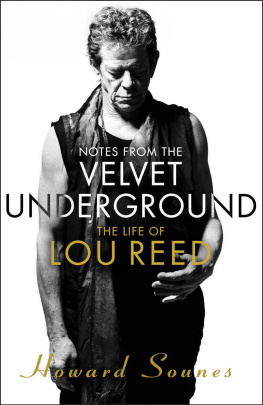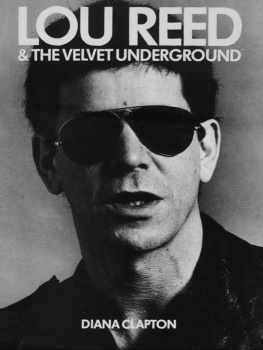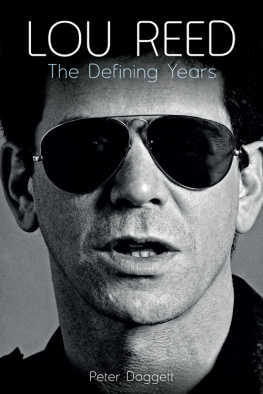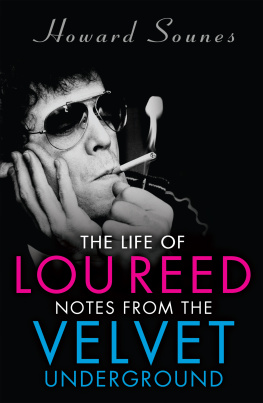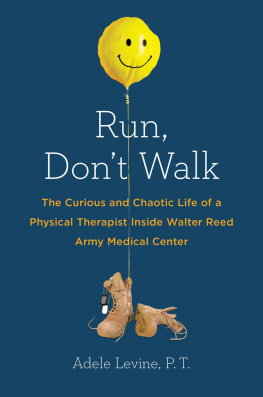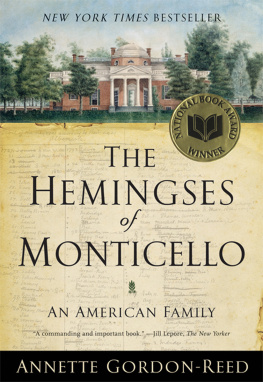| Notes from the Velvet Underground: The Life of Lou Reed |
| Howard Sounes |
| Transworld (2015) |
|
About the Book
Best known as the singer of the pop hit Walk on the Wild Side, Lou Reed was in fact one of the most intelligent and innovative songwriters of his era a sardonic, world-weary chronicler of underground culture and the dark side of human nature.
Starting with the Velvet Underground in the 1960s, Reed combined poetry with rock n roll to create almost fifty years of powerful and challenging music that influenced generations of artists. In this authoritative new book, biographer Howard Sounes shows how Reeds seminal work with the Velvets shaped his whole career.
Sounes reveals a complicated man, and an erratic recording artist, who was frequently quarrelsome and could be downright nasty. He was a bisexual who married three times, an alcoholic and a drug user who portrayed himself as a tough guy, but struggled with mental health issues in private. He was also an astute and sensitive songwriter whose subject matter ranged from drugs and transgressive sex to such tender love ballads as Perfect Day and Pale Blue Eyes.
Through meticulous research, including interviews with over 140 people who played a part in Reeds life, many speaking in public for the first time, Notes from the Velvet Underground is a vivid portrait of a talented but tortured artist.
Contents
Notes from the Velvet Underground
The Life of Lou Reed
Howard Sounes
I
Coney Island Baby
194259
LISTEN. LOU REED has fallen silent. That black-clad curmudgeon, the rock n roll poet they called the King of New York, co-founder of the Velvet Underground band, master of the wry, observational lyric, author of Walk on the Wild Side, Heroin and Sweet Jane, among hundreds of extraordinary and some quite ordinary songs, is dead. Lou lived so fast, he drank so much and he took so many drugs that few expected him to live to seventy-one. But now he has sung his last song. What was he really like?
One quick story serves as a paradigm. In the autumn of 1963, when Lou was twenty-one, he drove to St Lawrence University in upstate New York with his college band to perform at a fraternity weekend. The terms of the engagement were that LA and the Eldorados would play at a student dance on Friday night, then for an hour on a pleasure boat on the St Lawrence River on Saturday afternoon, before performing at a fraternity party in the evening. Im not playing on
You dont have a choice, Richard told him. You are going to play on the boat and be happy They are paying us a lot of money, and you have to do it.
That was not the way to speak to Lou, ever. Mishkin, fuck you! he retorted, thrusting his right hand through a glass door. Lou laughed as he looked at the injury he had done to himself, blood streaming down his arm as he held his hand up.
Because he doesnt have to play now, explains Richard, who took Lou to hospital for stitches. Hes won!
As he would show time and again during his long career, Lou would rather harm himself than be coerced into doing anything he didnt believe in. Such integrity is a mark of a true artist. It also helps explain why Lou never achieved as much success as he craved, or deserved.
This talented, difficult man was born Lewis Alan Reed at Beth-El Hospital in Brooklyn, New York, on Monday, 2 March 1942. A story later emerged that his real name was Louis Firbank, and this name is still cited in books and articles; it is completely erroneous.
The temperature fell below freezing the night Lou was born, bringing snow to the five boroughs of New York City, of which Brooklyn is the second largest and most populous: eighty-one square miles of tightly packed houses, tenements, shops and factories, bisected by pot-holed highways, tram lines and rust-brown elevated train tracks; the teeming borough separated from its more glamorous neighbour, Manhattan, by the East River, spanned by the majestic Brooklyn Bridge. It was wartime and the newspapers were full of stories of Americas struggle with the Japs, as well as the wider world war against the Hitler Axis. The mood at home was patriotic but jittery, with fears of attacks on the mainland. The day after Lou was born, to everyones dismay, the Brooklyn Eagle reported the sinking of a US destroyer by a German U-boat off the coast of New Jersey. The paper also warned its readers that the lights would shine as usual at Brooklyns fun fair, Coney Island, that summer, but at the sound of an alert signal the entire amusement area will be blacked out. In a time that has passed into history, men and women hurrying home from work in the snow were formally dressed, nearly everybody wore a hat and an overcoat and most adults smoked cigarettes. New releases at the cinema included Woman of the Year, with Spencer Tracy and Katharine Hepburn; while Eddie Cantor promised to keep you laughing in black face in a Broadway show called Banjo Eyes, a production that would now be considered outrageously racist. Lou was capable of casual racism himself in later life.
There was a substantial African-American community in Brooklyn, part of the boroughs heterogeneous mix of races and creeds, enlarged and diversified by waves of immigrants. Lous family was part of that classic American story. His father, Sidney Joseph Rabinowitz, was born in New York in 1913, the son of Russian Jews who had emigrated to America to escape persecution. Sids father, Mendel, was a printer who went bankrupt during the Depression, so Sid had known hard times. At the outbreak of the Second World War, the family was living in a tenement in Borough Park.
I know what it is like to be on the outside. I know what its like to have an unhappy childhood, Lou said in 1992, going to the root of his formative experiences. He felt the cruelty of that. Father and son may have been too alike. Sid had a quick wit, he enjoyed music and had ambitions to become an author. His mother persuaded him to study to become an accountant instead, a steady job that enabled him to join the middle class, but not work in which he could express himself. He was, perhaps, a frustrated man.
Radical politics thrived in blue-collar Brooklyn in the forties. Sids cousin Shulamit Shirley Rabinowitz caused such a stir in the garment industry, agitating for better pay, that the local newspapers nicknamed her Red Shirley.
1620 Avenue V, Brooklyn.
Toby married Sid not long after they met, and Lou was their first child. He was always closer to his mother than his father, taking after Toby in looks, as well as inheriting her chronic anxiety, something he learned to hide in public. Their first family home was a small house on Avenue V in the Sheepshead Bay area of Brooklyn. Shortly after the end of the war (Sid was registered for service, but not called up), they moved to a larger house in leafy Midwood. The Reeds were living there in 1947 when Lous sister was born. There has been some confusion over the years regarding the size and make-up of Lous family, with one author writing since Lous death that he had a younger brother.alike: dark, good-looking, sharp-tongued, with the same strong New York accent, both somewhat controlling; and they were close. One of Bunnys earliest memories of Lou was waiting at the window for him to come home from school. And when he came home I was so happy, and that never changed. I always adored him.
These were the innocent early years of childhood when Lou discovered the pleasure of drinking egg cream milk shake made with soda in the milk bars on Kings Highway, which he sang about nostalgically in his 1996 song Egg Cream. In the humid New York summer Lou would have been taken to the lido at Brownsville and to Coney Island. He was part of an extended Jewish immigrant family with numerous relatives who spoke with East European accents. He began his education at a local redbrick elementary public school, where he played stick ball and stoop ball in the yard, as he describes in My Old Man on the album

